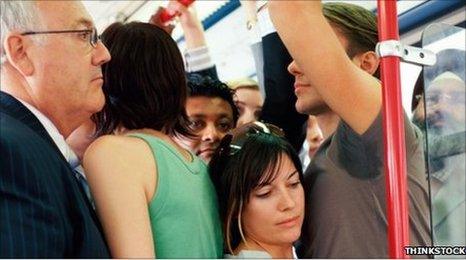Commuters 'priced off' overcrowded rail routes
- Published

MPs have called for passenger safety to be reviewed in the light of warnings that overcrowding is set to get much worse.
With rail passengers facing significant fare rises, and fears growing that already "unacceptable" levels of overcrowding will worsen, one train operator says it is being forced to price customers off its peak time routes. What can the government do to tackle the problem?
Bolton Railway Station is small, but busy.
Commuters wait anxiously for the 0808 Northern Rail service to take them to work in Manchester.
The platform is packed. Some could not even get on the earlier train. It was full.
"I pay £90 a month for this and you never get a seat. There are just not enough coaches, not enough trains," said one frustrated woman, as we watched a small, packed train pull in.
Another passenger joined in: "It leads to a lot of stress on board. It creates tension. They know the overcrowding exists, and yet there don't seem to be any steps to reduce it on any consistent basis."
'Cattle truck'
Northern Rail says its hands are tied. The Department for Transport has taken over responsibility for procurement to deliver extra capacity.
Two years ago Northern Rail was told by the government that it would be getting 182 extra carriages. But so far it has only had 10, with another eight on the way. It is nowhere near enough.
"It would be impossible to get anybody else on this train!" says Bolton Liberal Democrat councillor David Wilkinson, as we stand pinned in the vestibule between carriages.
"If this was a cattle truck, it would be illegal! I have been on this line where the guard has told people to get off.
"It's not just on this route, it happens elsewhere in the Greater Manchester area."
"This is a common feature of every train," says Mr Wilkinson, who is also a member of the Greater Manchester Integrated Passenger Transport Authority, a regional strategic body.
As we pull into Salford Crescent on the way to Manchester Piccadilly, there is not enough room for all those on the platform to get on. Some are left behind.
A young office worker looks flustered, and says it is the same story every day: "You have to get the next one and then you are late for work." How often? "About once a week."
And when was the last time she had a seat on her way to work? "Christmas, when it goes quiet".
'More for less'
A damning report published last week by the parliamentary Public Accounts Committee, Increasing Passenger Rail Capacity, external confirmed the situation is set to get worse for peak time journeys.
The committee's chair, Labour MP Margaret Hodge, says she was troubled by the findings that the Department for Transport has fallen behind on its procurement targets.
"It is very depressing that in London we think that there will be 15 per cent fewer extra places that had been planned by 2014, and in the rest of the country, mainly urban areas, where the congestion takes place, there will be a third fewer extra places than originally planned by 2014 .
"That's a heck of lot less additional places than had been planned for £9bn of investment".
Virgin chief executive Tony Collins says his company is already being effectively forced to price passengers off some of its peak time services.
He says the company's trains now carry 28 million passenger journeys per year, up from 14 million six years ago.
But with only two years left to run of its franchise, he says he cannot justify investing in new rolling stock. This leaves few options to manage levels of overcrowding which he acknowledges are "unacceptable":
"We introduced 30 per cent more services two years ago, and our value for money rating went up because we were able to smooth the demand by offering much more attractive pricing.
"But obviously as services get busier, then the only way of controlling the busy service is through pricing. We'd much prefer to put more capacity in and attract even more people to travel rather than having to price people off the trains."
Train companies have control over their peak time fares and are able to set their charges according to what they think the market can bear. The government controls off peak prices and has already announced they will go up.
The Transport Secretary Philip Hammond told the BBC that he would soon set out government plans to address the overcrowding issue. He insisted that reform will ensure Britain's railways do more, for less.
"We need to look at the whole structure of the industry, how the franchises are let, we need to look at train operators' work, we need to look at how Network Rail does its work and delivers efficiency in its programme," he said.
"We need to look at the role of my department. At the moment I have got civil servants here specifying which trains and which carriages have to be used at which times on which franchise. That does not seem to be the most obviously sensible way to run a railway.
He acknowledged that making the railway "fit for the future and affordable for passengers and taxpayers" was the "number one challenge" facing his department.
He is expected to announce detailed proposals before the end of November.
File on 4 is on BBC Radio 4 on Tuesday 16 November at 2000 GMT. Listen via the BBC iPlayer or download the programme podcast.
- Published13 November 2010
- Published9 November 2010
- Published9 November 2010
- Published8 October 2010